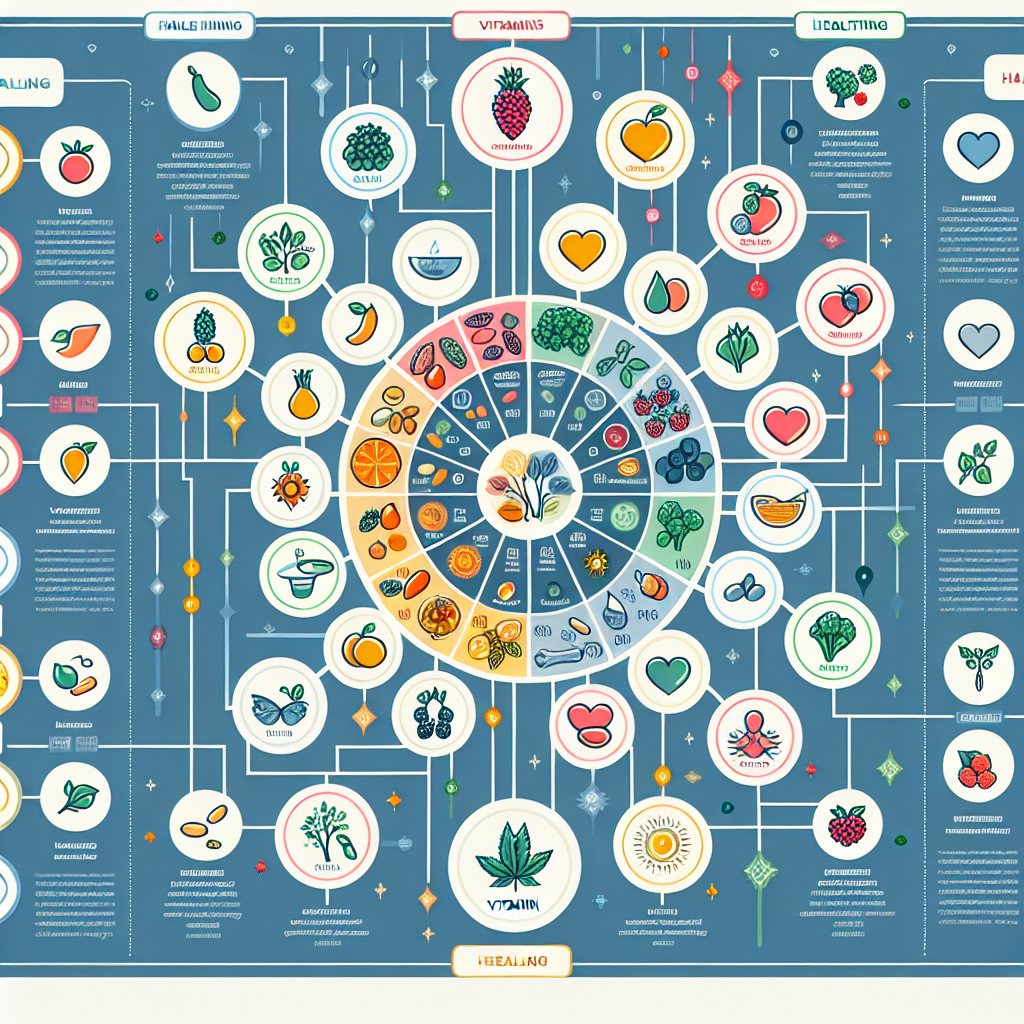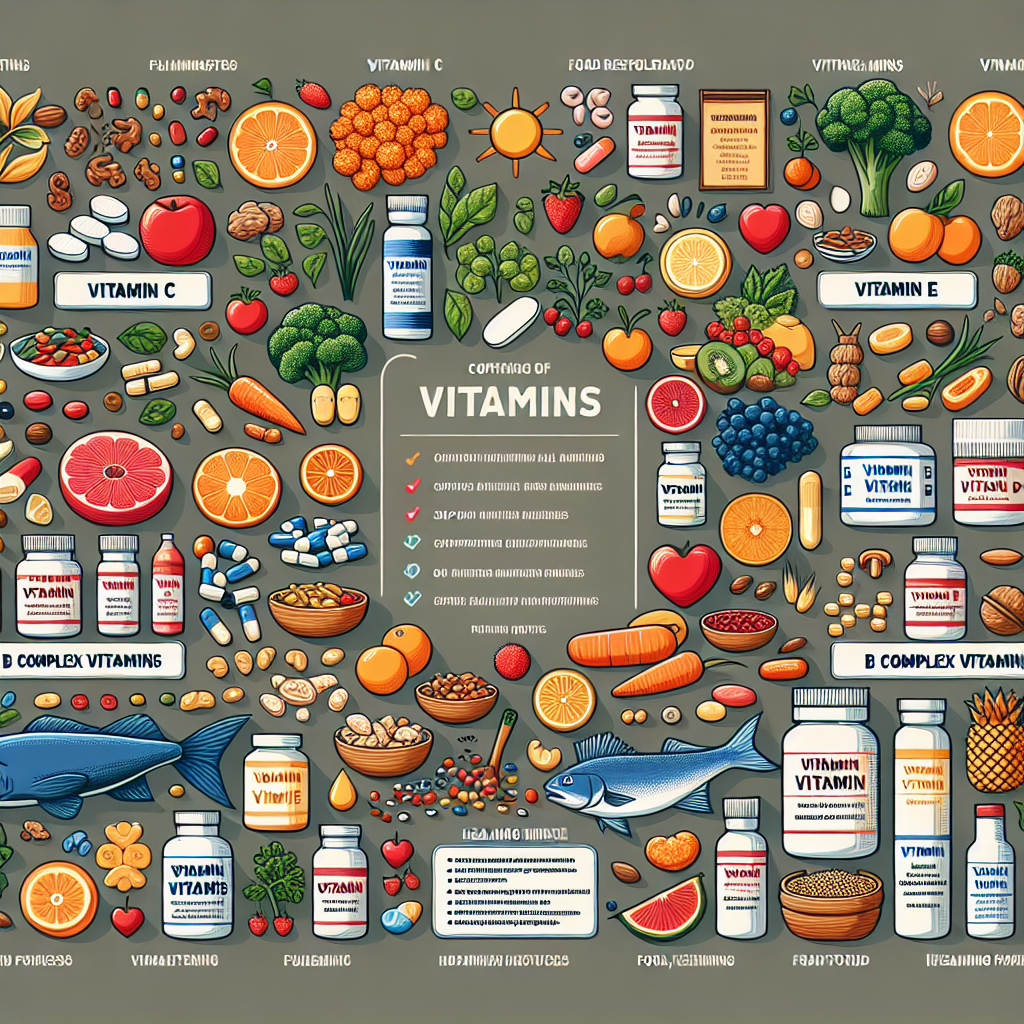Alternative Medicine: Which Vitamins Support Natural Healing?

Discover which vitamins support natural healing in the realm of alternative medicine. Learn more and enhance your health today. Click here.
Exploring the Role of Vitamins in Natural Healing Processes
Alternative medicine has been gaining traction in recent years as more and more people are seeking natural ways to support their health and wellbeing. One area of alternative medicine that has been particularly interesting is the role of vitamins in natural healing processes. Vitamins are essential nutrients that our bodies need to function properly and maintain good health. They play a crucial role in various bodily functions, including the immune system, metabolism, and cellular function. But beyond these basic functions, certain vitamins have been found to support the body’s natural healing processes, making them an important part of alternative medicine.
Vitamin C, for instance, is well-known for its immune-boosting properties. It helps stimulate the production of white blood cells, which are crucial in fighting off infections and diseases. But beyond its immune-boosting properties, Vitamin C also plays a key role in wound healing. It aids in the production of collagen, a protein that is essential for skin repair. This makes Vitamin C an important nutrient for those recovering from surgery or injury.
Vitamin A, on the other hand, is essential for maintaining the health of our skin and mucous membranes, which are our body’s first line of defense against pathogens. It also plays a role in the production and function of white blood cells, enhancing our body’s immune response. Moreover, Vitamin A has been found to support the healing of wounds and burns, making it a valuable nutrient in the recovery process.
Vitamin E is another nutrient that has been found to support natural healing. It is a powerful antioxidant that helps protect our cells from damage caused by free radicals. This protective function is particularly important in the healing process, as it helps prevent further damage to the affected area. Additionally, Vitamin E has been found to support wound healing by promoting the growth of new skin cells and reducing inflammation.
Vitamin D, meanwhile, is crucial for bone health. It aids in the absorption of calcium, which is essential for bone growth and repair. This makes Vitamin D particularly important for those recovering from fractures or other bone injuries. Moreover, recent studies have suggested that Vitamin D may also play a role in wound healing, although more research is needed to fully understand this potential benefit.
Lastly, the B vitamins, particularly B6 and B12, have been found to support the body’s natural healing processes. They aid in the production of red blood cells, which are crucial for delivering oxygen and nutrients to the affected area. They also support the function of the immune system, helping the body fight off infections and diseases.
In conclusion, vitamins play a crucial role in the body’s natural healing processes. They support the immune system, aid in wound healing, and protect our cells from damage. As such, they are an important part of alternative medicine and can be a valuable tool in supporting our health and wellbeing. However, it’s important to remember that while vitamins can support our health, they are not a substitute for a balanced diet and regular medical care. Always consult with a healthcare professional before starting any new supplement regimen.
The Power of Vitamins: A Deep Dive into Alternative Medicine

Alternative medicine has been gaining traction in recent years, with more and more people turning to natural remedies to support their health and wellbeing. One of the most popular forms of alternative medicine is the use of vitamins to support natural healing. This approach is based on the belief that the body has an innate ability to heal itself, and that by providing it with the right nutrients, we can enhance this natural process.
Vitamins are organic compounds that our bodies need in small amounts to function properly. They play a crucial role in various bodily functions, including metabolism, immunity, and cell growth. While we can get most of the vitamins we need from a balanced diet, some people may need to take supplements to meet their nutritional needs. This is particularly true for those with certain health conditions, dietary restrictions, or lifestyle factors that may limit their intake of certain nutrients.
One of the most well-known vitamins for supporting natural healing is vitamin C. This powerful antioxidant helps to protect our cells from damage and plays a key role in the production of collagen, a protein that helps to heal wounds and maintain the health of our skin, bones, and connective tissues. Vitamin C is also known for its immune-boosting properties, making it a popular choice for those looking to ward off colds and other illnesses.
Another vitamin that is often associated with natural healing is vitamin E. Like vitamin C, vitamin E is a potent antioxidant that helps to protect our cells from damage. It also plays a role in immune function and DNA repair. Some studies suggest that vitamin E may help to reduce inflammation in the body, which is a common feature of many chronic diseases.
Vitamin A is another key player in the world of natural healing. It is essential for maintaining the health of our skin and mucous membranes, which are our body’s first line of defense against pathogens. Vitamin A also plays a role in immune function and vision.
B vitamins, including B6, B9 (folic acid), and B12, are also important for natural healing. These vitamins play a crucial role in cell metabolism, helping our bodies to convert food into energy. They also support brain health, immune function, and the production of red blood cells.
While vitamins can certainly support natural healing, it’s important to remember that they are not a cure-all. They should be used as part of a holistic approach to health that includes a balanced diet, regular exercise, adequate sleep, and stress management. It’s also important to consult with a healthcare provider before starting any new supplement regimen, as some vitamins can interact with medications or have side effects when taken in large amounts.
In conclusion, vitamins are a powerful tool in the world of alternative medicine, offering a natural way to support our body’s innate healing processes. Whether you’re looking to boost your immune system, speed up wound healing, or simply maintain your overall health, vitamins can play a key role in your wellness journey. However, they should be used wisely and under the guidance of a healthcare provider to ensure safety and efficacy.
Unveiling the Healing Potential of Vitamins in Alternative Medicine
Alternative medicine has been gaining traction in recent years as more and more people are seeking natural ways to support their health and wellbeing. One area of alternative medicine that has been particularly intriguing is the use of vitamins to support natural healing. Vitamins, as we know, are essential nutrients that our bodies need to function properly. However, their potential in promoting healing and recovery is a topic that deserves a closer look.
Vitamin C, for instance, is widely recognized for its immune-boosting properties. It is a potent antioxidant that helps protect our cells from damage caused by free radicals. Moreover, it plays a crucial role in the production of collagen, a protein that aids in the healing of wounds. Therefore, ensuring an adequate intake of vitamin C can support the body’s natural healing processes.
Similarly, vitamin A is another nutrient that has significant healing potential. It is essential for maintaining the health of our skin and mucous membranes, which are our body’s first line of defense against pathogens. Additionally, vitamin A supports the health and function of our immune cells, further enhancing our body’s ability to heal and recover.
Vitamin D, often referred to as the “sunshine vitamin,” is another key player in the realm of natural healing. It is primarily known for its role in bone health, as it aids in the absorption of calcium. However, recent research suggests that vitamin D may also have anti-inflammatory and immunoregulatory properties, making it potentially beneficial in the healing process.
Vitamin E, a powerful antioxidant, is also worth mentioning. It helps protect our cells from oxidative stress, which can lead to inflammation and damage. By reducing oxidative stress, vitamin E can support the body’s natural healing processes. Furthermore, it has been found to promote wound healing, particularly in individuals with diabetes.
Lastly, the B vitamins, including B6, B9 (folic acid), and B12, are essential for a variety of bodily functions, including the production of red blood cells and the maintenance of the nervous system. These vitamins also play a role in the body’s immune response, which is crucial for healing.
While the healing potential of vitamins is promising, it’s important to remember that they are not a cure-all. They should be used as part of a holistic approach to health and wellbeing, which includes a balanced diet, regular exercise, adequate sleep, and stress management. Moreover, before starting any new supplement regimen, it’s always advisable to consult with a healthcare professional to ensure it’s safe and appropriate for your individual needs.
In conclusion, the role of vitamins in alternative medicine is becoming increasingly recognized. Vitamins C, A, D, E, and B complex have all shown potential in supporting the body’s natural healing processes. However, they should be used responsibly and as part of a comprehensive approach to health. As research in this area continues to evolve, we can look forward to gaining a deeper understanding of the healing potential of vitamins and how best to utilize them in our pursuit of optimal health.